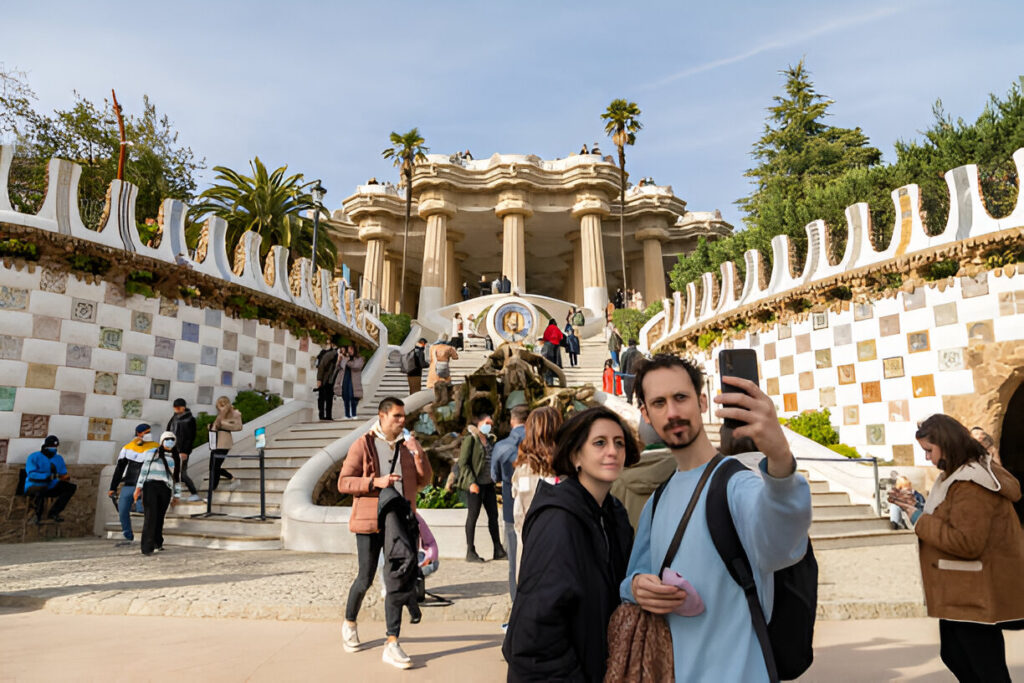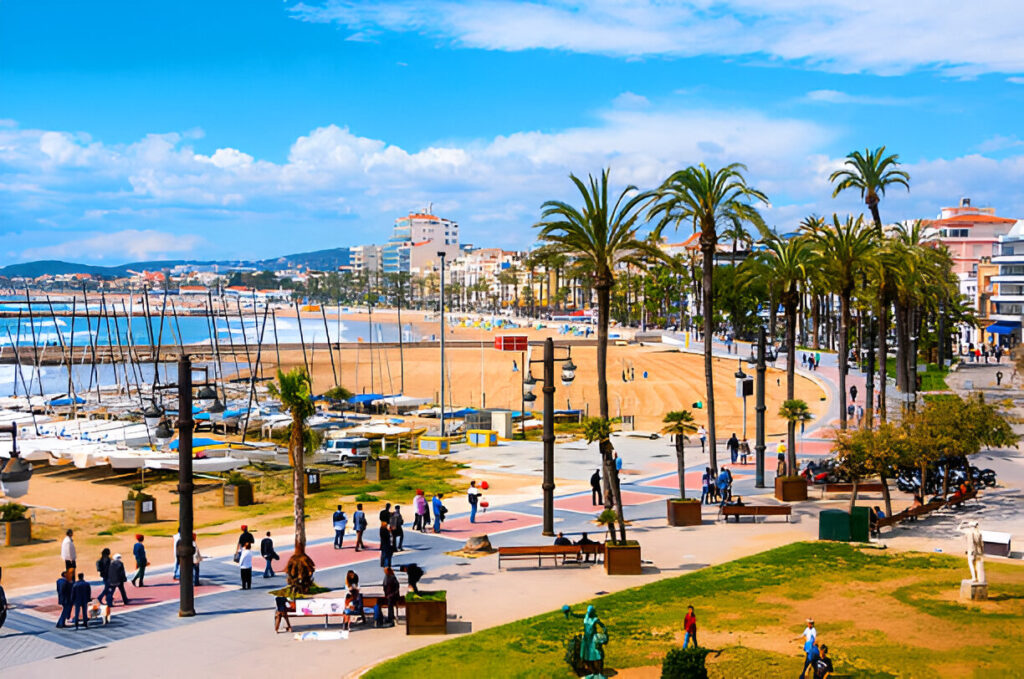Living in Spain: Spain attracts people worldwide for its vibrant culture, sunny climate, and relaxed pace of life. Many choose to move to Spain, seeking a better quality of life, drawn by its Mediterranean lifestyle and diverse cultural heritage.
Expats find Spain appealing not only for its warm weather and beautiful landscapes but also for its affordable living costs and excellent healthcare system.
Whether you’re dreaming of coastal living or exploring historic cities, Spain offers a compelling mix of modern amenities and rich traditions that make it a desirable place to call home.
Why Do People Move to Spain?
Spain is a popular destination for expatriates due to a combination of appealing factors that enhance the quality of life and offer unique cultural experiences.

Weather and Sunshine
Spain enjoys a Mediterranean climate in most regions characterized by hot summers and mild winters. Along the southern and eastern coasts, such as Costa del Sol and Costa Blanca, the weather is mainly sunny, with over 300 days of sunshine annually. This climate attracts individuals and families seeking a warmer environment and a sunnier outlook on life.
Outdoor Activities
The Mediterranean lifestyle promotes outdoor living and leisure activities year-round. Expats and locals enjoy dining outdoors at sidewalk cafes, indulging in beach activities along Spain’s extensive coastline, and participating in outdoor sports like hiking, cycling, and sailing. This emphasis on outdoor leisure fosters a relaxed pace of life. It encourages a healthier balance between work and leisure, making it especially appealing to retirees and those seeking a more laid-back lifestyle.
Historic Cities and Landmarks
Spain’s cities are renowned for their historic architecture and landmarks. Cities like Madrid, known for its Royal Palace, Plaza Mayor, Prado Museum, and Barcelona, with its iconic Sagrada Família and Park Güell, offer glimpses into Spain’s rich history and artistic achievements. These cities serve as cultural hubs where expats can immerse themselves in centuries-old traditions and marvel at architectural marvels that blend Moorish, Gothic, and Renaissance influences.
Cultural Diversity
Beyond its historic sites, Spain’s cultural diversity is evident in its regional customs and traditions. From flamenco dancing in Andalusia to Basque cuisine in the northern provinces, each region boasts unique cultural practices contributing to Spain’s vibrant tapestry. Expats can explore and participate in local festivals, such as La Tomatina in Buñol or the Running of the Bulls in Pamplona, experiencing firsthand Spanish communities’ lively spirit and cultural pride.
Cost of Housing
While major cities like Madrid and Barcelona can be expensive, Spain offers affordable housing options in smaller cities, towns, and rural areas. Expats can choose from various accommodations, including apartments, villas, and traditional homes, often at lower costs than other Western European capitals.
Everyday Expenses
Spain’s overall cost of living is relatively moderate compared to many other European countries. Daily expenses such as groceries, dining out, and transportation are affordable, allowing expats to maintain a comfortable lifestyle without financial strain. Access to quality healthcare through Spain’s public healthcare system and reasonable costs for utilities and leisure activities further contribute to its affordability.
Is Spain a Good Place to Live?
Spain offers residents a high quality of life, supported by various factors that enhance well-being and overall satisfaction.

Quality of Life Factors
Spain boasts a rich quality of life characterized by a balanced lifestyle, cultural richness, and excellent amenities. Residents enjoy a relaxed pace of life influenced by the Mediterranean climate, fostering outdoor activities and social engagement.
The country’s diverse cultural heritage and vibrant social scene provide ample entertainment, leisure, and personal fulfillment opportunities. Whether enjoying traditional festivals, exploring historical sites, or savoring local cuisine, Spain offers residents a dynamic and fulfilling lifestyle.
Healthcare System and Services
Spain’s healthcare system is highly regarded for its accessibility and quality of care. The country offers public and private healthcare options, with public healthcare funded through taxes and available to residents and legal residents.
The system provides comprehensive coverage for medical services, including primary care, specialist consultations, hospital treatment, and emergency services. Expats benefit from affordable healthcare costs and access to modern medical facilities with advanced technology.
Spain’s healthcare system contributes significantly to its reputation as a desirable living place, ensuring residents receive quality medical care when needed.
Educational Opportunities
Spain offers diverse educational opportunities for residents, including a robust public education system and numerous private and international schools. Public schools provide free education to residents, offering a curriculum emphasizing language skills, mathematics, sciences, and humanities.
Additionally, Spain is home to reputable universities and institutions offering higher education programs in various fields, attracting students worldwide.
The country’s educational infrastructure supports lifelong learning and personal development, making it an ideal choice for families seeking quality education for their children and individuals pursuing academic and professional advancement.
Expats Living in Spain: Experiences and Insights
Living in Spain as an expatriate offers a unique blend of cultural immersion and lifestyle benefits, accompanied by specific challenges and support systems.

Cultural Integration
Expats often find Spain welcoming and inclusive, with opportunities to integrate into local communities through language learning, participation in cultural events, and forming friendships with locals. Spanish communities value social connections and often embrace expatriates interested in local customs and traditions. This integration process enriches expats’ experiences and deepens their understanding of Spanish culture.
Social Activities
Joining local clubs, sports teams, or hobby groups provides expats with additional avenues for integrating into Spanish communities. By participating in community festivals, neighborhood gatherings, or volunteer activities, expats can build meaningful connections and contribute positively to their local surroundings.
Language Barrier
While many Spaniards speak English, especially in tourist areas, mastering Spanish remains essential for fully integrating into daily life and understanding cultural nuances. Expats may need help with language barriers in administrative tasks, healthcare settings, or social interactions, requiring patience and commitment to language learning.
Bureaucracy and Legalities
Navigating bureaucratic procedures, such as obtaining residency permits, registering with local authorities, or understanding tax obligations, can be challenging for expatriates. Seeking guidance from expat networks or professional advisors can simplify these processes and ensure compliance with Spanish laws.
Expat Communities
Spain hosts thriving expat communities across its cities and coastal regions, offering support networks, social gatherings, and practical advice on living in Spain. Expats can connect through online forums, local expat associations, and social media groups dedicated to sharing experiences and offering assistance with relocation, housing, and cultural adaptation.
Professional Services
Consulting with relocation experts, legal advisors, or specialized expat services can help expatriates navigate complex aspects of living in Spain. These professionals provide tailored guidance on residency requirements, healthcare options, tax implications, and other practical matters, ensuring a smooth transition and ongoing support for expats and their families.
Spain’s Quality of Life: What Makes It Unique?
Spain offers a distinctive quality of life enriched by its natural landscapes, vibrant cultural scene, and culinary traditions, making it a sought-after destination for residents and visitors alike.

Mediterranean Climate
Spain enjoys a Mediterranean climate characterized by distinct seasons:
- Hot Summers: Temperatures often reach the high 80s to 90s Fahrenheit (30-35°C), particularly in southern regions like Andalusia and the Balearic Islands.
- Mild Winters: Winters are generally mild, with temperatures rarely dropping below freezing in most coastal areas, making it comfortable for outdoor activities year-round.
Diverse Natural Landscapes
Spain’s diverse geography offers residents a range of natural landscapes:
- Mountains: Explore the Pyrenees in the north for skiing and hiking or the Sierra Nevada in the south for dramatic peaks and winter sports.
- Coastlines: Enjoy sandy beaches along the Mediterranean and Atlantic coasts, with crystal-clear waters ideal for swimming, sailing, and sunbathing.
- National Parks: Discover stunning national parks like Picos de Europa in northern Spain, home to rugged terrain, lush valleys, and diverse wildlife.
Historic and Cultural Sites
Spain’s cities are treasure troves of historical and cultural landmarks:
- Madrid: Visit the Royal Palace, Prado Museum, and Retiro Park, offering insights into Spain’s royal history and artistic legacy.
- Barcelona: Explore Gaudí’s Sagrada Família and Park Güell, icons of Catalan Modernism that blend art, architecture, and spirituality.
- Seville: Marvel at the Gothic Cathedral, Alcázar Palace, and Plaza de España, showcasing Moorish influence and Andalusian charm.
Festivals and Celebrations
Spain’s festivals are vibrant and diverse, celebrating local customs and traditions:
- La Tomatina: Experience the annual tomato-throwing festival in Buñol, where participants engage in a friendly food fight amidst music and revelry.
- Semana Santa: During Holy Week, witness elaborate processions in cities like Seville and Granada, which combine religious devotion with artistic pageantry.
Regional Gastronomy
Spanish cuisine is a tapestry of regional flavors and ingredients:
- Tapas Culture: Enjoy small plates of local specialties like patatas bravas, gambas al ajillo (garlic shrimp), and croquetas, perfect for sharing and sampling.
- Seafood: Indulge fresh seafood along the coast, from grilled sardines in Malaga to paella in Valencia, highlighting Spain’s maritime bounty.
Dining Culture
Dining in Spain is a leisurely affair that emphasizes socializing and enjoying good food:
- Market Visits: Explore bustling food markets like Mercado de San Miguel in Madrid or La Boqueria in Barcelona, where vendors offer fresh produce, meats, and gourmet treats.
- Michelin-Starred Dining: Treat yourself to haute cuisine at renowned restaurants like El Celler de Can Roca in Girona or Azurmendi near Bilbao, showcasing innovative dishes and culinary excellence.
Considering a move to Spain? Marfour provides a balanced perspective on the pros and cons of living in this vibrant country. From its sunny climate and rich cultural heritage to its bureaucratic challenges and healthcare system nuances, Marfour offers comprehensive insights.
Whether you’re attracted to Spain’s affordable living costs or concerned about language barriers, their resources help you navigate the complexities of expatriate life, making informed decisions about relocation.
FAQs
Is Spain a safe country to live in?
Spain is generally considered safe for residents and visitors alike. Major cities and tourist areas have low crime rates, and the country’s healthcare system ensures access to emergency services if needed.
What are the healthcare options like in Spain?
Spain has a dual healthcare system, with public and private options available. Public healthcare is accessible to residents and legal residents, funded through taxes, and provides comprehensive coverage. Private healthcare offers additional options for those seeking specialized care or faster access to medical services.
How affordable is it to live in Spain?
The cost of living in Spain varies depending on the region. While major cities like Madrid and Barcelona can be more expensive, smaller cities, towns, and rural areas offer more affordable housing and everyday expenses. Overall, Spain is compared favorably with other Western European countries regarding the cost of living.
What opportunities are there for expats in Spain?
Expats in Spain can enjoy a rich cultural life, access to diverse landscapes for outdoor activities, and a welcoming community. There are opportunities to integrate into local communities through language learning, participation in festivals, and engaging in social activities.
Conclusion
In conclusion, Spain offers a unique quality of life defined by its Mediterranean climate, diverse natural beauty, rich cultural heritage, and renowned culinary traditions.
Whether exploring historic cities, participating in vibrant festivals, or savoring regional cuisines, residents of Spain benefit from a lifestyle that promotes leisure, cultural enrichment, and community engagement.
With accessible healthcare, affordable living costs, and a welcoming atmosphere for expatriates, Spain is a desirable destination for those seeking a fulfilling and enjoyable life in Europe.


